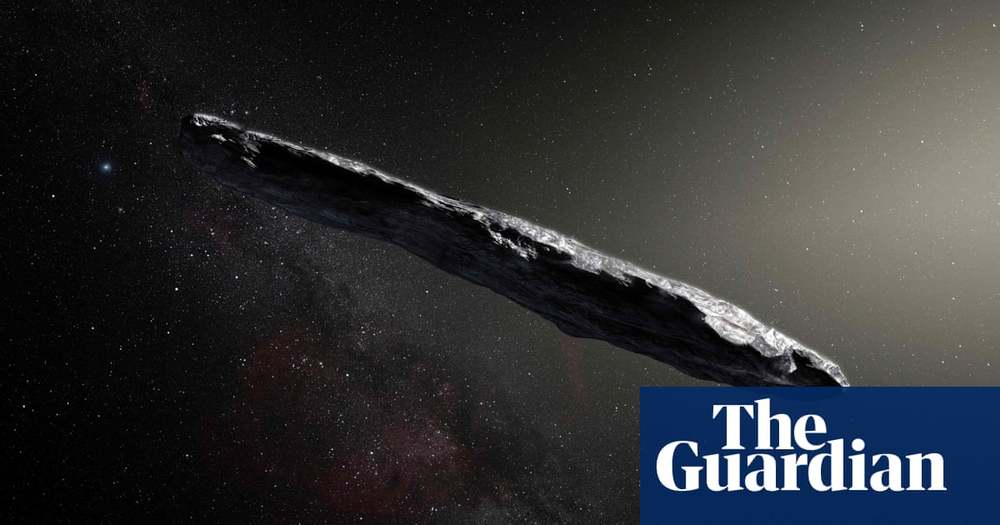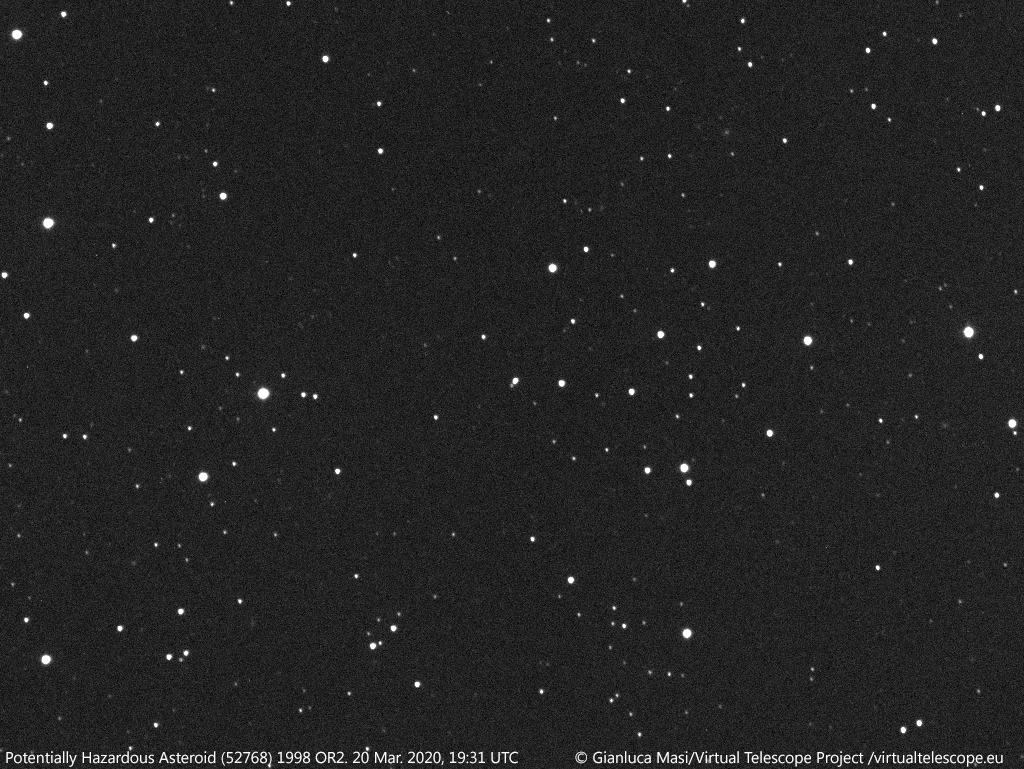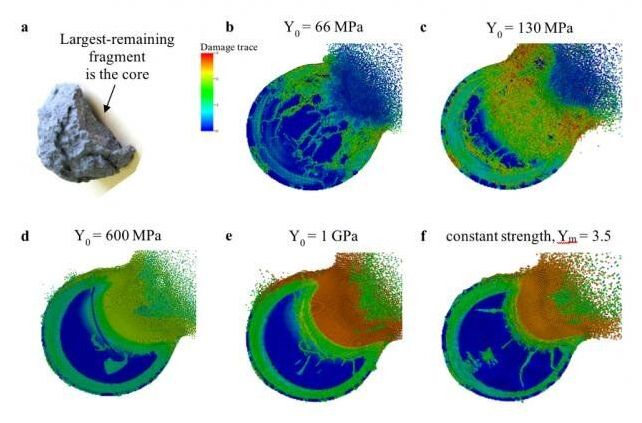The T-55 medium tank took all the best traits of the T-54, but added on a series of upgrades necessary for the crew to survive the penultimate weapon: the atomic bomb.



The cigar-shaped interstellar visitor to our solar system known as ‘Oumuamua could be the remnants of a larger body that was torn apart by its host star, according to researchers.
The dark, reddish object that hurtled into our solar system in 2017 and was named after the Hawaiian word for messenger or scout has long puzzled scientists.
Among its peculiarities is the lack of an envelope of gas and dust that comets typically give off as they heat up. Further work by experts suggested the body was accelerated by the loss of water vapour and other gases – as seen with comets but not asteroids. The upshot was that ‘Oumuamua was labelled a “comet in disguise”.

The huge “potentially hazardous” asteroid 1998 OR2 is just a few weeks away from its close encounter with Earth, and you can watch the giant space rock’s approach online or with a small telescope.
While asteroid 1998 OR2 is large enough to wreak havoc on Earth if it were to strike our planet, it won’t come anywhere near a collision when it flies by on April 29.

This is the latest Lifeboat Foundation update on our worldwide pandemic.
It is also at https://www.facebook.com/groups/lifeboatfoundation/permalink/10158811699298455.
Key summary of this report:
Following these four recommendations should improve everyone’s chances by a factor of 16 and get this pandemic under control. (All percentages are approximate, of course.) Such recommendations would bring the end to our extreme quarantines.
VENTILATORS
Ventilators can be shared in an emergency by 2 to 8 patients each. Simply sharing with 2 people plus following our four recommendations will increase the overall ventilator supply by a factor of 32. Learn more at https://www.nytimes.com/2020/03/26/health/coronavirus-ventilator-sharing.html.
Patients are experiencing death rates as high as 80% on ventilators as discussed at https://time.com/5818547/ventilators-coronavirus. (50% is the best death rate being recorded anywhere.)
It is estimated that only 20–30% of coronavirus patients who are having problems breathing have the typical Acute Respiratory Distress Syndrome (ARDS) that calls for a ventilator. A CT scan will help identify such patients. Learn more at https://www.esicm.org/wp-content/uploads/2020/04/684_author-proof.pdf.
We recommend that the following be tried before a ventilator:

The zone under international law stretches 200 nautical miles from the Japanese coastline.
It was flying into the Sea of Japan according to Seoul’s Joint Chiefs of Staff.
The US and China have called for Pyongyang to re-enter talks to end its nuclear and missile programmes, according to the Daily Star.

Planetary defense researchers at Lawrence Livermore National Laboratory (LLNL) continue to validate their ability to accurately simulate how they might deflect an Earth-bound asteroid in a study that will be published in the April issue of the American Geophysical Union journal Earth and Space Science.
The study, led by LLNL physicist Tané Remington, also identified sensitivities in the code parameters that can help researchers working to design a modeling plan for the Double Asteroid Redirection Test (DART) mission in 2021, which will be the first-ever kinetic impact deflection demonstration on a near-Earth asteroid.
Asteroids have the potential to impact Earth and cause damage at the local to global scale. Humankind is capable of deflecting or disrupting a potentially hazardous object. However, due to the limited ability to perform experiments directly on asteroids, understanding how multiple variables might affect a kinetic deflection attempt relies upon large-scale hydrodynamic simulations thoroughly vetted against relevant laboratory‐scale experiments.



The oldest fossil of a modern bird yet found, dating from the age of dinosaurs, has been identified by an international team of palaeontologists.
The spectacular fossil, affectionately nicknamed the ‘Wonderchicken’, includes a nearly complete skull, hidden inside nondescript pieces of rock, and dates from less than one million years before the asteroid impact which eliminated all large dinosaurs.
Writing in the journal Nature, the team, led by the University of Cambridge, believe the new fossil helps clarify why birds survived the mass extinction event at the end of the Cretaceous period, while the giant dinosaurs did not.
Imagine the following scenario. You are a doctor working in a hospital in a very large and relatively polluted city, normally subject to a high level of seasonal respiratory ailments. Moreover, your healthcare system is stretched because of budget cuts and the devolution policies of central government. As a medical doctor you also know that flu viruses routinely mutate and may even be transferred from animals to humans. Exactly how all this happens varies from year to year – as does the exact mortality rate, though the pattern of infection and mortality is relatively well understood. In all these cases, the vast majority of people remain uninfected, asymptomatic or subject to mild symptoms that pass within a week. However, if the number of those requiring intensive hospital-based treatment rises above a certain percentage, the healthcare system can be quickly challenged. At that point, the doctor may panic, and armed with social media, he can now spread his concern around the world. But is the sheer appearance of a new virus strain the overriding cause?
The only part of this story that is really new is the availability of social media to spread news about any outbreak of such flu-like diseases. But one should not underestimate a general background awareness of overstretched public healthcare systems around the world, due partly to an ageing population but mainly due to the neoliberal policy horizon. Actions like the initial Chinese response to suppress the ‘whistleblower’ Li Wenliang have happened at the start of previous outbreaks – but now whistleblowers can communicate directly with the world. It is easy to forget that various new strains of flu are routinely reported in the media each year, with greater or lesser morbidity than earlier ones. Governments around the world normally monitor the situation in their own way, which means that the real figures have probably always been much higher than officially stated – both who catches the flu and who dies from it. Much depends on the motivation of the national health authorities to test specifically for the flu’s presence. After all, flu typically operates as a ‘nudge’ to worsen existing health conditions, and those conditions may be the primary medical focus.
We clearly don’t know everything we need to know about COVID-19. But the same applied to all the previous flu epidemics, which humanity has so far managed to survive. What is different now is the level of scrutiny and accountability of the response, mostly due to the recent information technology revolution, especially social media. This very basic socio-technical point has made it easier for the World Health Organization to designate COVID-19 a pandemic. The WHO’s insistence on mass testing (even if it doesn’t catch those who have recovered) also fits the same logic. What is striking so far about the global response are the efforts that societies have taken to reorganize themselves in order to protect those who are perceived as most vulnerable. It is quite unprecedented, especially in a world that is so otherwise imbued with capitalist values.
In the end, COVID-19 is the first virus to go properly ‘viral’, starting with Li Wenliang. That start has anchored the subsequent response. In particular, it has triggered a chain reaction that has exposed the different cultures of risk management around the world, as well as the varying conditions of national health care systems. Think of it as Nature’s brute audit on humanity’s sustainability. Indeed, that may be the virus’ main direct legacy – which means that public health care is bound to improve all round in the long run. However, if the lockdown continues long enough, the virus may end up questioning the modus operandi of contemporary capitalism in a way that long-standing complaints about inequality have failed to do. I expect that the vast majority of the population will manage to cope reasonably well during our period of ‘species captivity’, while consuming significantly less of the planet’s resources – that is, assuming that the increasing energy demands of online activities don’t first cause a short-circuit!
Be calm, carry on and stay well – and see you on the other side!
This message was sent to my various students at the University of Warwick, the day after the UK stepped up its fight against COVID-19 to near ‘lockdown’ level. One course I’ve been teaching for the past couple of years at the undergraduate and Master’s level has been ‘The Sociology of End Times’. I’ll need to add a section on ‘pandemics’ next year…